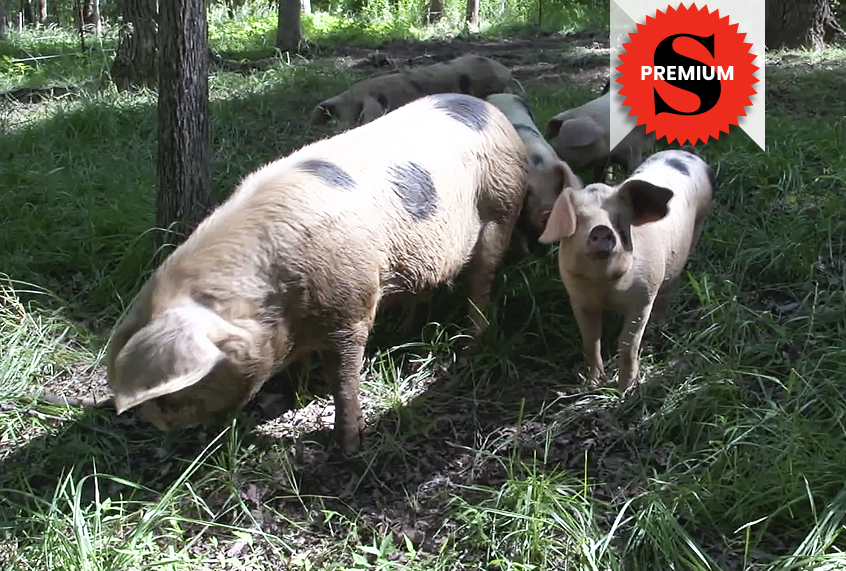“This Farm Is Medicine,” about Murray Provine, a businessman who turned to progressive farming after being diagnosed with prostate cancer, is another thought-provoking chapter in director Peter Byck’s “Soil Carbon Cowboys” documentary series, which is breaking new ground, getting the word out about the regenerative farm movement.
You can watch the full documentary “This Farm Is Medicine” on Salon Premium, our new ad-free, content-rich app. Here’s how.
Salon spoke with Byck before, about “One Hundred Thousand Beating Hearts,” and here we talk about this brave new farming world with adaptive-multi-paddock grazing expert Allen Williams, who is featured in “This Farm is Medicine.”
Please explain what you do as a consultant to those of us who doesn’t know the first thing about sustainable farming.
I am a partner in three different businesses — Soil Health Consulting, LLC; Joyce Farms, Inc.; and Standard Soil. All three inter-relate in many ways. In our consulting business, we work with farmers and ranchers, branded food companies, processors, NGO’s, conservation groups, consumer groups and others to teach regenerative agriculture principles and practices, soil and ecosystem health, and how to produce high attribute foods. We do this through a combination of individual consulting, academies, workshops, conferences, webinars, films, etc. In working with producers, we help them first change their minds — an important first step as you cannot change your practices without first understanding what has been going wrong. We then present the principles and foundation, provide very practical step-by-step methods of transitioning their operations to regenerative practices, enhance their marketing and improve quality of life. In short, we start by giving them hope.
What are the short and long term costs for a conventional farmer switching over to sustainable farming?
The short answer to this is that “it depends.” The costs for transitioning are variable, depending on where they are at currently. Everyone starts at a different place. The first cost that has to be recognized and dealt with is the human dynamics. Farmers and ranchers can be very traditional and conventional, and they exert moderate to extreme peer pressure on each other. Even within families. This peer pressure causes many to “count the costs” of making the transition. Their neighbors, or own family members, may make fun of them, call them idiots, environmentalists, tree huggers, etc. They may even be ostracized. This is the first cost and the hardest hurdle to get over. The financial costs are actually far easier to handle than the human dynamic costs. Done right and in a step-wise fashion, the costs of transitioning are minimal, and many can improve net margins within the first one to three years.
On a national and/or local level, can you describe the popularity of sustainable farming?
I will talk in terms of regenerative farming. Sustainable farming simply means maintaining status quo. Why would we want to do that? It does not make sense to maintain an already degraded resource. The interest in regenerative ag is rapidly growing, not just in the U.S., but globally. We have seen exponential growth in the past 10 years. It is growing so rapidly that we simply cannot keep up with demand for consulting and speaking. That being said, we are still only reaching 5 percent of the total farming population. To reach more, we need to be able to effectively train and equip others to work directly with farmers to do some “hand holding” during the transition process.
How would you describe Murrary Provine as a client?
Murray has been a model client. He latched on to our adaptive management principles very quickly and was determined to make significant changes on his farm. He has been a quick study and a pleasure to work with. He has made amazing progress and made very positive changes.
How’d you feel being filmed by Peter Byck?
This film is one of several that I have been a part of with Peter. Peter does a fantastic job with filming people. He makes everyone feel at ease and understands how to guide folks towards what really needs to be filmed. I have been a part of numerous films and interviews, so the process is not new to me.
Are you a documentary fan? Can you name a few of your favorites?
I enjoy well-made, impactful documentaries. “The Soil Carbon Cowboys” series has been very good, as have others such as “Sustainable,” etc. The most impactful have actually been videos by the leaders in this space such as Gabe Brown, Greg Judy, Ray Archuleta, Dave Brandt, Ian Mitchell-Innes and many others.
Check out one man’s back-to-the-land movement toward a better life in “This Farm is Medicine,” on Salon Premium, our new ad-free, content-rich app.
Reading this in the app already? Go back to the main menu and select “SalonTV” to find Salon Films and Salon original shows.

